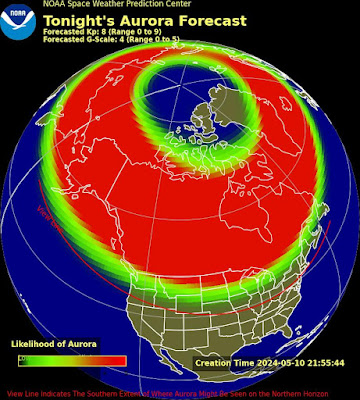Aside from ponding and high water on maybe a couple roads, we avoided flooding,
But the nor'easter has one last bummer for us. It will block an expected spectacular sky show tonight, More on that in a minute.
THE RAIN
First, some rainfall and details and forecasts and news from Saturday. Rain totals were in line with expectations, with almost everybody in Vermont seeing one to two inches.
The heaviest rain, again, as forecast, were in or near the Green Mountains. Also far southeast Vermont and parts of the southern Champlain Valley collected more than most people.
The winner of the Vermont rainfall sweepstakes was Guilford, in the far southeast corner of the state with 2.88 inches. Runners up were 2.76 inches in Brattleboro; 2.66 in the Nashville section of Jericho; 2.43 inches in Bolton, 2.4 inches in Quechee and, 2.35 inches in Jeffersonville.
My unofficial rain gauge here in St. Albans, Vermont caught an impressive 1.75 inches of rainfall.
Ye of little faith thought the main rivers in Vermont would get higher than they got. I knew there would be little if any river flooding, but I thought that the National Weather Service and the USGS were under-forecasting peak crests a little.
But nope! They got it exactly right.
The usually problematic Otter Creek in Center Rutland peaked at about 1.7 feet below flood stage. The Mad River at Moretown, another traditional trouble maker, stopped at more than three feet below minor flood level.
Those rivers and all the rest of them in Vermont, rose noticeably but stopped far, far from flooding anything. So good news there.
The rain shut off for the most part by midnight. But there's a little more on the way from this. Not much, though. Those of us who do get more rain between now and Monday morning will see less than a tenth of an inch,
You've no doubt noticed it's been cold today for June 1, Temperatures have been running in the 50s all afternoon, with a spot 60 or two in southern Vermont, where they have been glimpses of sun. This is nearly 20 degrees cooler than average for this time of year.
The clouds, and the lingering few showers out there this afternoon sets us up for a potential big disappointment tonight.
NORTHERN LIGHTS
coronal mass ejection the other day. It was bigger than usual and more or less aimed at Earth.Which heightens the chances of seeing northern lights far more south than usual, and covering more of the sky than you'd expect.
Some observers think this one would be the best since at least May 10, 2024, when most of the United States had quite a show. Here in Vermont, skies unexpectedly cleared that evening, so we got to enjoy it, too.
NOAA's Space Weather Division says the event will have its greatest impact on Earth today and tonight, meaning you should be outdoors looking at the sky after dark.
Except if you live in Vermont (and a few other places in northern New England and southern Quebec). It turns out Saturday's nor'easter will take one last slap at us tonight.
That storm is way up in Quebec now, but it will a swing one last disturbance through Vermont tonight. The disturbance will bring a lot of clouds and light showers overnight, especially to northern and central parts of Vermont.
The overcast would block any view we have of what's going on in the sky. The forecast timing of the thickest clouds is atrocious. As of this afternoon, forecasters expect the cloudiest skies with fewest breaks between 8 pm. this evening and 5 a.m. Monday.
After that, once daylight hits, skies should rapidly clear in much of Vermont. It figures.
The valleys of southern Vermont, especially the Connecticut River Valley below White River Junction, do have a shot at partly clear skies overnight.
NOAA says the effects of this thing might linger into Monday night. So Vermonters have another shot at seeing the northern lights, but they might not be as good as tonight would have been. Skies over Vermont Monday night and before dawn Tuesday are expected to be mostly clear.
On the other hand, we already have reports of some spectacular shows in the northern Plains and Rockies before dawn today. So the show might well be over by Monday night.
These things can new pretty unpredictable, so you never know.




